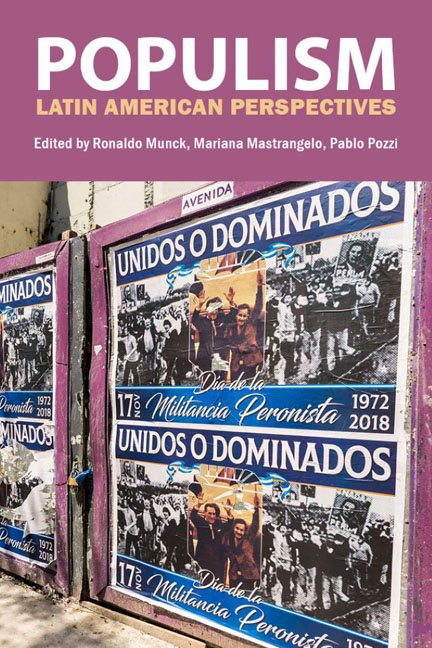Book contents
- Frontmatter
- Contents
- Abbreviations and acronyms
- Foreword
- Introduction
- 1 Populism in Latin America: development, democracy and social transformation
- 2 Peronism in Argentina: left or right?
- 3 The populist left in Chile: socialists and communists from 1936 to 1973
- 4 The left and the Workers’ Party in Brazil: a party between populism, social policies and the popular vote
- 5 Brazil, Bolsonaro and populism of the right
- 6 Political dilemmas of the government of López Obrador: between populism, democracy and the left in Mexico
- 7 The Bolivarian process in Venezuela: socialism, populism or neoliberalism?
- 8 Populist responses to crises of market democracy: the case of Bolivia’s Evo Morales
- 9 Ecuador: populism and the 2007– 17 political cycle
- 10 The Nicaraguan crisis and the mirage of left populism
- 11 Populism and the right in Latin America
- 12 Populism and the left in Latin America
- Afterword: a tale of two “people”: national popular and twenty-first-century Latin American populisms
- Contributors
- Index
Introduction
Published online by Cambridge University Press: 23 January 2024
- Frontmatter
- Contents
- Abbreviations and acronyms
- Foreword
- Introduction
- 1 Populism in Latin America: development, democracy and social transformation
- 2 Peronism in Argentina: left or right?
- 3 The populist left in Chile: socialists and communists from 1936 to 1973
- 4 The left and the Workers’ Party in Brazil: a party between populism, social policies and the popular vote
- 5 Brazil, Bolsonaro and populism of the right
- 6 Political dilemmas of the government of López Obrador: between populism, democracy and the left in Mexico
- 7 The Bolivarian process in Venezuela: socialism, populism or neoliberalism?
- 8 Populist responses to crises of market democracy: the case of Bolivia’s Evo Morales
- 9 Ecuador: populism and the 2007– 17 political cycle
- 10 The Nicaraguan crisis and the mirage of left populism
- 11 Populism and the right in Latin America
- 12 Populism and the left in Latin America
- Afterword: a tale of two “people”: national popular and twenty-first-century Latin American populisms
- Contributors
- Index
Summary
Populism is perhaps one of the most overused, yet under-analysed, terms in political discourse today. It can embrace authoritarian and nativist right-wing politicians, but also those on the left who appeal for popular support for transformation. In its dominant usage it is seen as inimical to the values of liberal democracy. Yet others see it as part of the construction of a “people”-centred project that can help us democratize democracy, to put it that way. What is clear is that much of the debate around populism has been from the perspective of the global North and the voice of the South has been largely missing.
The term “populism” today spells, for most people in the global North, something akin to racism and with dark memories of fascism lurking in the background. The “populists” who come to mind are Orbán, Le Pen, Farage or Trump, who cultivate a mass base around the needs of the “left behind” or native-born. The political elites are cast as globalizers, not from somewhere in particular, and dangerously complacent about the dangers of being swamped by mass immigration.
In Latin America the same term has had a very different resonance. It is bound up with democratization, the incorporation of the working classes, and the making of the national developmental state. Its emergence is marked by the crisis of the conservative export-oriented state in the 1930s that burst into the open after the Second World War, with the growth of an organized labour movement and the consolidation of nationalism in the new world order that emerged. This gave way to what can be called a compromise state that replaced the old oligarchic state, and in which the popular masses were both mobilized and controlled by what became known as populist state politics.
There have been many interpretations of populism in Latin America. Early studies tended to place it in terms of the modernization of society and the emergence of disposable masses, waiting to be captured by an ideology that would promote social change while maintaining the stability of the dominant order.
- Type
- Chapter
- Information
- PopulismLatin American Perspectives, pp. 1 - 8Publisher: Agenda PublishingPrint publication year: 2023



